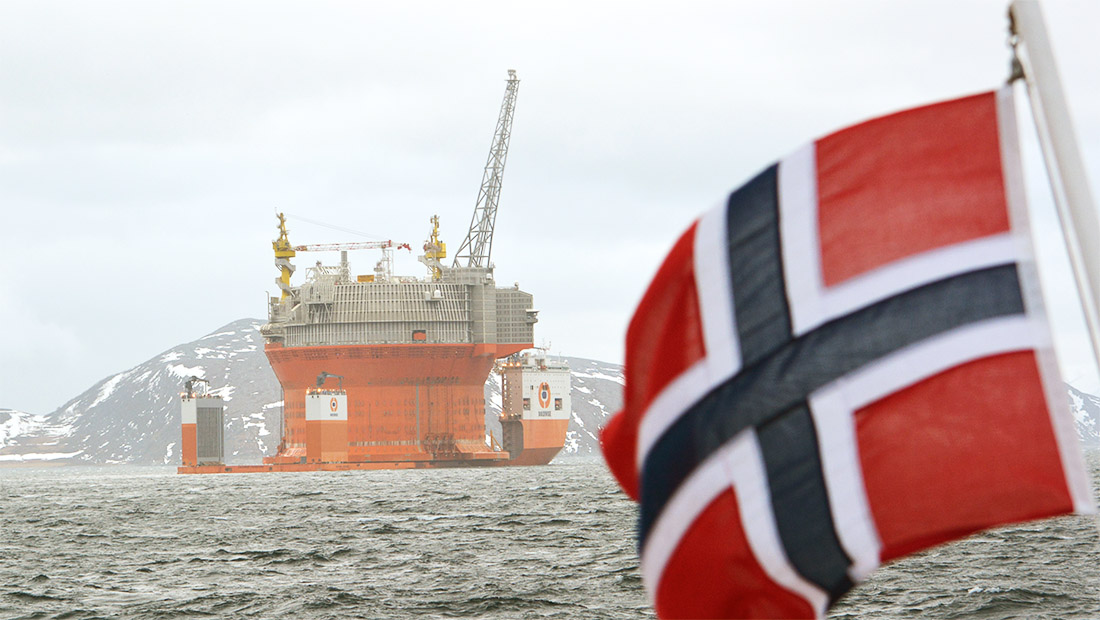Oil Price Fluctuates After Norway Strike
July 18, 2018 | Expert Insights

Hundreds of workers on Norwegian offshore oil and gas rigs went on strike after rejecting a proposed wage deal, closing Shell’s Knarr field, which produces 23,900 barrels of oil equivalent per day. Oil prices rose marginally in response.
Recently, Brent crude oil hit a three-month low as worries over supply disruptions eased and the focus moved to increasing production and potential damage to global growth from the escalating trade dispute.
Background
Prior to 1950, West Asian countries exhibited low levels of socioeconomic development; however, the discovery of vast oil reserves catalyzed the rapid creation of wealth. In particular, the economies of oil-rich countries were transformed from largely agricultural to rentier economies: a system which derives all or a substantial portion of its national revenues from the rent of indigenous resources to external clients. Since then, modern Arab oil-exporting economies have become heavily dependent on oil. Hydrocarbon and government activities account for the majority of total GDP in nearly every West Asian country.
Oil prices have been one of the most watched trends in economics during the 21st century. From 2000 to 2008, the price of oil saw an unprecedented spike, going from under $25 per barrel to almost $150 per barrel. Rapidly increasing demand in emerging economies such as China and India and production cuts by the Organization of Petroleum Exporting Countries (OPEC) in the Middle East drove the price of oil to record heights.
Oil is not only an essential commodity, but also a political one. Most oil exporting countries in Africa, Asia and South America have tumultuous histories owing to political disputes which surrounded oil reserves directly or indirectly. In January 2018, for the first time in three years, the price of oil reached a record high of $70 per barrel, after Libya, Venezuela and Iran faced economic and political crises. The last time oil was valued this much was in December 2014.
Analysis
Norway’s ship-owners and two oil unions have not planned compromise talks to end a five-day strike over wages and pension benefits before a planned escalation of the stoppage from 15 July. While it is expected to have negligible influence on oil prices currently, an extension of the strike will eventually push Brent crude prices up.
The employers, who say workers already have fair wages, are considering countermeasures if the strike doesn’t end soon. In 2012, employers threatened to shut down all oil and gas operations in Norway after a strike choked off 13% of the country’s output. The government can invoke laws to curtail strikes which cause large-scale economic damage. As oil prices decline, Norway may be pressurised to return to normal production levels by western allies, particularly US.
The Wall Street Journal reported that the Trump administration is considering a rare step: teaming up with other Western countries to simultaneously release oil stockpiled for emergencies. Michael Tran, director of global energy strategy at RBC Capital Markets, doubts that tapping emergency oil stockpiles is necessary. Moreover, US refineries are already producing at extremely high levels.
Disruptions in Libya and Venezuela have been instrumental in lifting prices to their highest levels in nearly four years. The National Oil Corporation (NOC) announced the re-opening of oil terminals in Eastern Libya after renegade General Khalifa Haftar agreed to hand over control of the ports. Brent crude suffered the biggest price decline in two years after it dropped by 6.9% to $73.40 per barrel.
Venezuela’s political crisis has caused annual inflation to reach an astounding 27,000% in May 2018. The opposition blames the hyperinflation on strict currency controls, enacted 15 years ago by former President Hugo Chavez, as well as excessive money printing. Experts say they might have to declare force majeure on its oil exports as production plunges and its ports are unable to ship enough crude.
US President Donald Trump has repeatedly held OPEC responsible for lofty oil prices and complained that prices are "too high,” despite the fact that Trump's own tough stance on Iran, the world's fifth-largest oil producer, contributed to the price spike.
Counterpoint
Saudi Arabia, the de-facto head of OPEC, has assured US that they will increase production to keep prices low. Saudi Arabia is offering extra crude oil on top of its contractual supplies to some buyers in Asia. However, experts argued that unleashing more oil now will leave Saudi Arabia with little firepower to respond to future shortages.
Assessment
Our assessment is that the Norwegian strike is a mild disruption to the global oil markets as of now. We believe that the reimposition of sanctions on Iran by US, set to take effect in August, may affect oil prices. We feel that the true impact will depend on OPEC’s decision and ability to increase output.








Comments